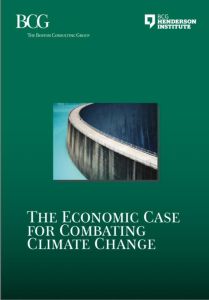Join getAbstract to access the summary!

Join getAbstract to access the summary!
Jens Burchardt, Philipp Gerbert, Stefan Schönberger, Patrick Herhold, Christophe Brognaux and Joonas Päivärinta
The Economic Case for Combating Climate Change
Boston Consulting Group, 2018
What's inside?
Early movers on climate-change mitigation stand to reap the most economic gains.
Recommendation
In the 2016 Paris Agreement, nations around the world committed to capping the increase in the average global temperature to 2ºC [3.6ºF] by 2050. Experts debate whether countries, individually or cooperatively, can meet this aggressive target. In this incisive overview for policy makers and business leaders, Boston Consulting Group professionals report on their examination of carbon reduction strategies for the seven heaviest-polluting countries. They find that nations acting alone can achieve substantial progress on environmental goals, with significant economic rewards in tow, and the sooner they take action, the greater their gains.
Summary
About the Authors
Jens Burchardt et al. are professionals at the Boston Consulting Group.





















Comment on this summary